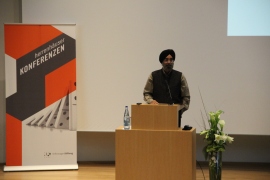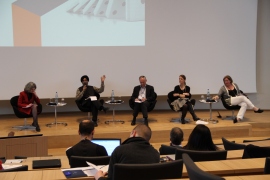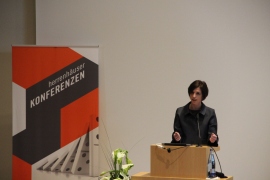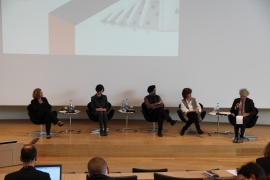Archive for May, 2014
Herrenhausen Conference: Re-Thinking Social Inequality
“Re-Thinking Social Inequality” conference was organised by the Volkswagen Foundation at the Herrenhausen Palace in Hannover, Germany during 12-14 May 2014. The foundation had invited some of the very well-known and established scholars in the field of Sociology, Economics, Political Science and History to discuss the problem of inequality in different parts of the world and identify possible themes for research and policy prescription.
The concept note of the conference pointed out that the “objective is to present new research questions pertaining to the theme of social inequality as well as innovative methodological approaches to this field; through this, the conference aims to challenge traditional perspectives and opens up new ways of thinking”. It further pointed out that “[T]he conference aims to facilitate a dialogue between experts from various backgrounds. We would like to reflect on the recent and forthcoming developments, and to discuss new opportunities to cope with social inequality”.
It is true that the world has experienced great economic transformations in the last two to three decades. Economic growth in China and India and many of the so-called “Third-World” countries have reduced the percentage of people that lived below the poverty line. Such countries have been experiencing high economic growth and prosperity. However, with this growth inequality between classes has also increased – the rich is becoming richer and the poor is getting marginalised and is unable to compete in the so-called “free-market” situation. The policies of liberalization, referred to as “neo-liberalism”, have in fact constrained the economic freedom of a large mass of populations.
On the first day of the conference, eminent scholars like Jan Nederveen Pieterse (University of California, Santa Barbara) and Branko Milanovic (City University of New York) provided a global perspective on inequality. Both these scholars spoke predominantly about the “economic” inequality around the world. Pieterse provided a sociological approach to understanding inequality around the world and argued that in developing countries inequality is tolerated but not poverty. He discussed the dangers of populism and plutocracy for the economic health of a society. In the end, he also discussed about citizenship rent, migration and hollowing of the middle class and their implications for inequality. Pieterse was, however, criticised for taking a narrow economistic approach and not talking about the social and cultural structures like caste, gender and ethnicity that continue to reproduce “social” inequality in different parts of the world.
Milanovic spoke about the growing disparity in wealth and income amongst people. For him, not just between individuals, inequality between the rural and the urban societies is also growing. Milanovic explained how the average Gini has increased in last twenty years.
Besides the Sociological and the Economic perspectives, Andreas Gestrich (German Historical Institute, London) provided an excellent historical perspective to understanding inequality. He pointed out how “Rethinking Inequality” had first happened in 1754 with the publication of Rousseau’s “Discourse on Inequality”. Rousseau discussed two major kinds of inequality – (1) natural or physical inequality, and (2) moral and political inequality. Gestrich also discussed extreme inequality and its implications for individual liberty and how inequality was seen as a threat to social cohesion and solidarity in society.
The second day began with the keynote address by Paul Collier (Oxford University) who brilliantly discussed the relationship between inequality and democracy. Stephen Mau (University of Bremen) and Wolfgang Merkel (Berlin Social Science Centre) also provided critical comments on Collier’s lecture. Stephen Mau was strongly influenced by the Lipset thesis – “the more well-to-do a nation, the higher the chances that it will sustain democracy”. Mau finds a strong elective affinity between the economic development and democracy. He pointed out that the growth of the middle class and education will promote democracy.
Mau’s thesis is, however, very weak. There are a lot of studies in Latin America and Asia that have shown how the middle class has, instead of promoting democracy, promoted what Guillermo O’Donnell has called “bureaucratic authoritarianism”. Studies have also shown that middle class allows decentralization as long as it does not affect their interests. For Rueschemeyer and others, it is neither the bourgeois nor the middle class that promotes democracy; the real class that extends the democratic project is the working class. Mau’s assertion that democracy cannot sustain or exist in poor countries is very naïve. The Indian case has very clearly defied such claims.
 (Panel on Democracy and Social Inequality)
(Panel on Democracy and Social Inequality)
Mau also thinks there is low voter turn-out in low income countries which are not true as the Indian case has clearly challenged this assumption. In India, the poor and the marginalised have come out in large numbers to vote in the elections as they think that politics is the only way through which they can redistribute resources in their favour. This increasing participation of the poor, low caste and the marginalised population in the elections has been referred by Christophe Jaffrelot as “India’s Silent Revolution” and by Yogendra Yadav as India’s “Second Democratic Upsurge”.
Wolfgang Merkel discussed about “Embedded Democracy” and argued that how democracy is embedded in five major factors – (1) electoral regime, (2) political rights, (3) civil society, (4) horizontal accountability, and (5) effective power to govern. He also pointed out that there are three principles that determine the overall quality of democracy – freedom, control and equality.
The second keynote address was given by John Keane (University of New South Wales, Sydney) who is considered as one of the pioneers of civil society studies. For Keane, though the idea of civil society originated in Europe, it has now become a universal phenomenon. Keane’s understanding of civil society was a little romantic (I think he chose to be so) as he saw civil society as a sphere of civility, equality, freedom and respect. For him, civil society represented a civilized society. Talking about the relationship between markets and civil society, Keane argued that capital is destructive of civil society and equality. Markets are uncivil and poisonous and they produce class relations and inequality.
 (Panel on Civil Society & NGOs)
(Panel on Civil Society & NGOs)
David Brady (Berlin Social Science Centre) provided an excellent critique of John Keane’s lecture. For him, Keane is very romantic about civil society. Brady’s emphasis, however, lied on the institutions of state, rather than civil society. Brady pointed out that the state can reduce inequality by redistributing resources, insuring against risks, and investing in capabilities and opportunities.
The third keynote address was given by Surinder S. Jodhka (Jawaharlal Nehru University, New Delhi) and Vincent Houben (Humboldt University, Berlin) who took a cultural turn to understand and explain inequality. Houben and Jodhka emphasised the role of culture and ethnicity in explaining how inequality is reproduced in everyday social life of people. Jodhka urged scholars to go beyond the numbers and quantitative explanations and understand inequality through qualitative and anthropological perspectives. For him, the numbers and data tell us only about the disparity in income and wealth; they don’t really tell us the “experience” of inequality which is value-based and expressed through hierarchy and humiliation.
The third session of the second day gave opportunity to three young scholars from Ghana, Cuba and India to understand their perspective on inequality. Patrick Mahama from the University of Professional Studies, Accra, Ghana spoke about the distribution of the resources in Ghana. He argued that while proper management of natural resources can contribute to economic development and mitigation of poverty; its mismanagement can result in widening inequality and conflict among people.
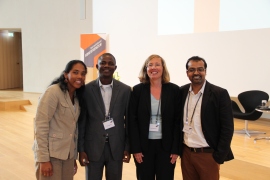 (Rosa, Patrick, Almult Steinbach, & Sahoo)
(Rosa, Patrick, Almult Steinbach, & Sahoo)
Rosa Maria Voghon from the University of Havana, Cuba spoke about the challenges for equality and social justice in socialist and communist countries. For her, studies on inequality have given a lot of emphasis on socio-economic structures and ignored the socio-political factors. For her, socio-political factors are important and need to be properly understood. She also spoke about the Cuban social model and the challenges it pose for economic development and sustainability.
Following Karl Polanyi’s theory of “double movement”, Sarbeswar Sahoo from the Indian Institute of Technology Delhi discussed how India has managed globalization and neo-liberal reforms. Sahoo noted that though the economic reforms of 1991 have helped India overcome the slow “Hindu-rate of Growth”, it has adversely affected the interests of the poor and marginalised. As a response to such marginalization, a large number of pro-poor and protectionist “counter-movements” have emerged not just to challenge the exclusive and exploitative policies of the neo-liberal market but also to facilitate new agendas of inclusion, welfare rights and social justice.
The last session of the day was devoted to poster presentations by more than forty young scholars from various parts of the world who presented their perspectives on inequality. Some of the themes were related to: natural resource conflict, home ownership and public support, middle class and higher education, citizenship participation, civil society organizations and social inequality, health inequality, women and youth movements, environmental justice, land use, intergenerational mobility, domestic workers, ethnic inequality, etc.
The final day predominantly discussed issues related to education and inequality. Shoshana Zuboff (Harvard Business School) spoke about the access to professional training and higher education. Jutta Allmendinger (Berlin Social Science Centre) discussed about the expansion of the tertiary sector and the diversification of degrees and certificates and urged to bridge the gap between the academic and vocational education. Jannis Kallinikos (London School of Economics) discussed about the role of information and communication technology in reframing work and social interaction.
The final session of the conference discussed some of the major aspects of the conference and identified important themes for further research in understanding and explaining inequality around the world. The panel was chaired by Almut Steinbach from the Volkswagen Foundation and included speakers such as Jutta Allmendinger, Shoshana Zuboff, Surinder S. Jodhka and John Keane. The speakers emphasized that inequality is a growing concern for all and needs special attention. It is not confined to just income and wealth but also to various other socio-cultural, ethnic and gender dimensions. There is also environmental aspect to inequality which John Keane strongly emphasised.
 (Participants going to the Conference Venue)
(Participants going to the Conference Venue)
The Herrenhausen Conference thus provided an excellent three day opportunity to engage with the various dimensions of inequality around the world. There may not have been any ready-made answer on how to solve it. Solution to any problem first needs understanding the complexity of the problem. If anything, I would say that the Herrenhausen conference was a successful in uncovering the complex and multi-dimensional nature of Inequality and its implications not just for different groups of people but also for the sustenance of democracy, individual rights, social justice and the economic system itself.








